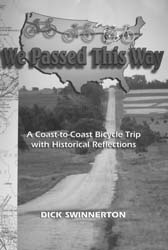Retire to The Road
A Cupertino man and his friends bike across America in 'We Passed This Way'
'DAMN! I WISH I was a young fella again," Frank told me from the porch of his picket-fenced house, leaning on his cane, his oxygen tank nearby. Frank was an 85-year-old retired farmer I met on my year-long solo bicycle tour.
"Bicycle," he said. "I used to do that when I was a boy. I'd make me a peanut-butter-and-jelly sandwich, and I'd ride my bike on down the road. Over the bridge outside of town. To the edge of the woods. I'd always wish I could keep going, wondering what I'd see 'round the next bend."
Suddenly, Frank dug into his pin-striped white trousers, pulled out a fiver and stabbed me with it, pleading, "Have a drink on your trip on me. I wish I could go with you, but I can't, so have a drink for me."
It might be too late for Frank to go bicycle touring, but judging by some of the liveliest souls I encountered on the road, retirement seems to be the best time for an adventure: plenty of cash, patience for smelling the roses and little to lose.
Most of all, the older folks are always pleasantly surprised at how much gas is left in their muscles. Dick Swinnerton, a Cupertino retiree who has taken the long road beyond the edge of town, has chronicled his coast-to-coast bicycle trip in a new locally published book, We Passed This Way.
In the summer of 1994, Swinnerton, Roger Wedel (also from Cupertino) and Kirby Miller--all retirees in their mid-50s--bicycled across America. After two years of planning routes, destinations and logistics, they rode out from Fort Stevens State Park near Astoria, Ore. With their wives driving a support van, they finished 75 days and 3,800 miles later at Revere Beach, Mass.
Along the way, they ran into a little danger, ate a few mouthfuls of road dust, flew down roads with plenty of tailwind and befriended many strangers, discovering themselves as well as the beauty of America's heartland.
The roads are full of chance encounters, and the Swinnerton party's encounter with Rodney and Carol Hopwood rates as one of the most serendipitous events of We Passed This Way.
The Hopwoods are a kind couple who had offered shelter and friendship to two of America's most beloved travelers, Peter and Barbara Jenkins. The Jenkinses highlighted the Hopwoods in their bestselling books The Road Unseen and The Road West about their walk across America. It is the sort of happy coincidence that can make a traveler believe that someone is smiling down from above.
BICYCLE TOURING is a personal endeavor. We all have our own guidelines. Where I have found only one lasting rule of thumb--"When the going gets tough, call it a day and look for a cold beer"--these musketeers have enough rules, dictates and commandments to turn We Passed This Way into a handy how-to guide for first-time bicycle voyagers. A fair portion of the text seems dedicated to the nuts and bolts of touring such as equipment, food, lodging, maps and communication.
Swinnerton liberally splices his practical advice with historical anecdotes and trivia about the places his group visited. Sometimes the transitions are jarring; other times, engaging. Wedged between the covers are hand-drawn maps, snapshots, an itinerary and a mileage log. Consequently, reading Swinnerton's play-by-play account of the journey gives one the feeling of thumbing through someone's travel diary stuffed with Polaroids and brochures collected along the way.
Part travel log, part historical text, We Passed This Way isn't a colossal literary achievement. It is an empowering story about three ordinary old guys realizing their dreams and having the time of their lives, told with humor, bright-eyed wonder and humility.
[ San Jose | Metroactive Central | Archives ]
Copyright © Metro Publishing Inc. Maintained by Boulevards New Media.
![]()
 Lure of the Open Road : The asphalt beckons readers to journey from sea on sea in the pages of Dick Swinnerton's travel journal.
Lure of the Open Road : The asphalt beckons readers to journey from sea on sea in the pages of Dick Swinnerton's travel journal.
We Passed This Way by Dick Swinnerton; Easy Break, First Time Publishing; 220 pages; $16.95 paper.
From the April 2-8, 1998 issue of Metro.
![[Metroactive Books]](/books/gifs/books468.gif)